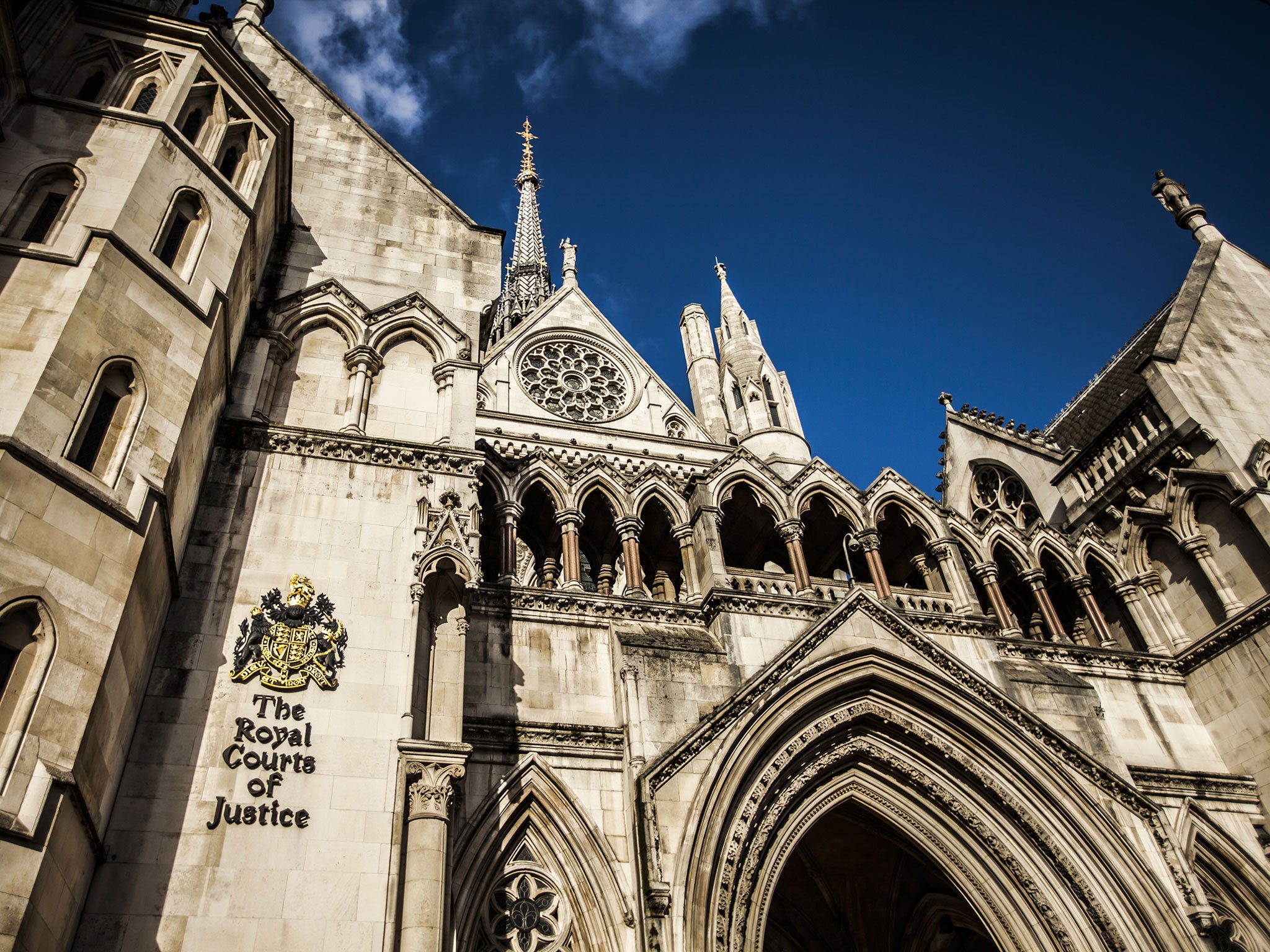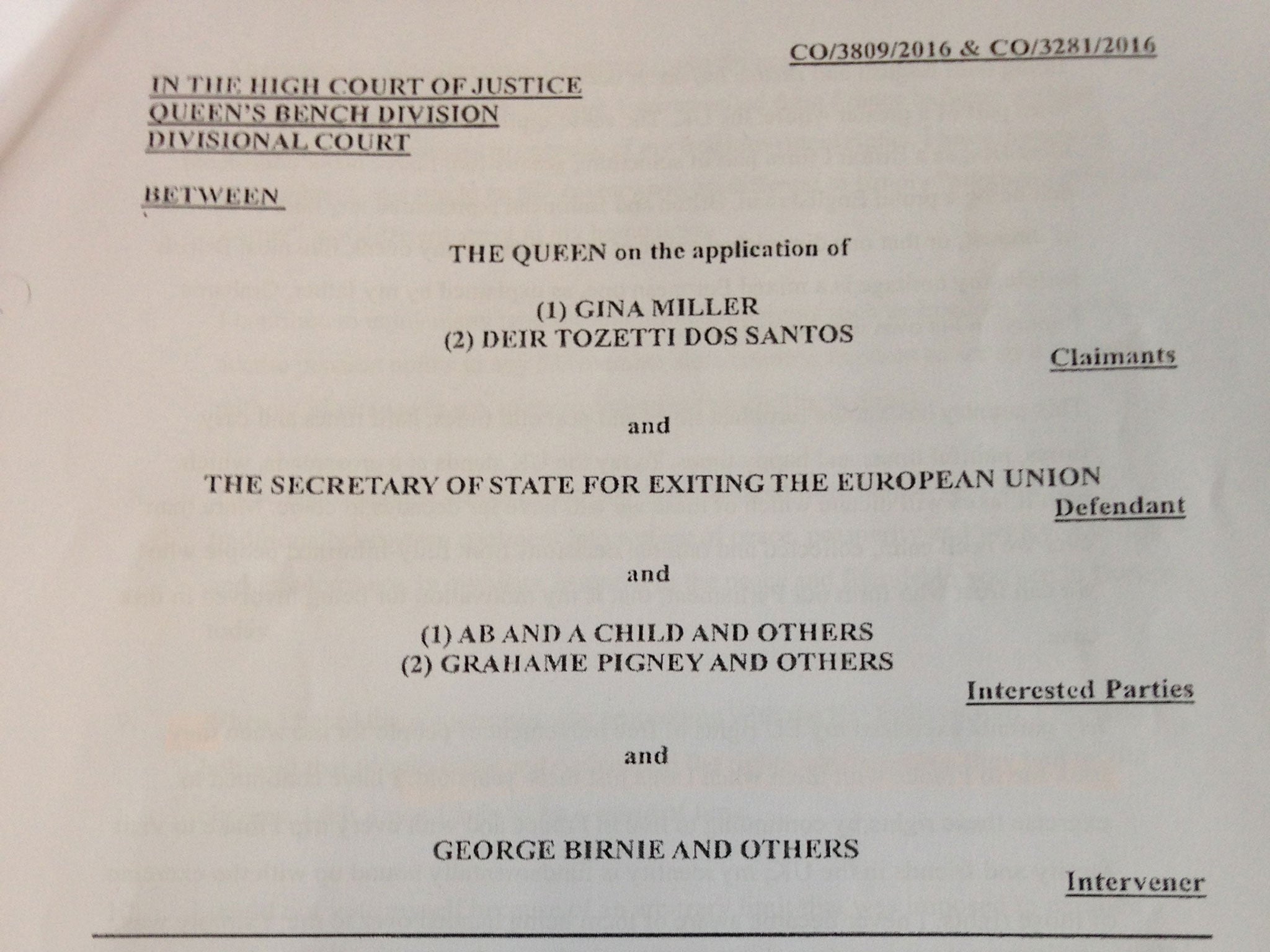Legal arguments against Brexit revealed for the first time, ahead of High Court battle
Exclusive: Legal documents in High Court case against Brexit, obtained by The Independent, reveal arguments anti-Brexit campaigners will make in fight against withdrawal from the EU

Your support helps us to tell the story
From reproductive rights to climate change to Big Tech, The Independent is on the ground when the story is developing. Whether it's investigating the financials of Elon Musk's pro-Trump PAC or producing our latest documentary, 'The A Word', which shines a light on the American women fighting for reproductive rights, we know how important it is to parse out the facts from the messaging.
At such a critical moment in US history, we need reporters on the ground. Your donation allows us to keep sending journalists to speak to both sides of the story.
The Independent is trusted by Americans across the entire political spectrum. And unlike many other quality news outlets, we choose not to lock Americans out of our reporting and analysis with paywalls. We believe quality journalism should be available to everyone, paid for by those who can afford it.
Your support makes all the difference.Theresa May’s plan to trigger Article 50 without consulting Parliament is “the biggest attack on democracy the UK has ever known”, a court will be told in the legal case against Brexit, The Independent can reveal.
Lawyers will argue the referendum was marred and undermined by “exaggerated concerns” and “outright falsehoods” by Leave campaigners that left many voters uninformed about what they were actually voting for.
Legal documents seen by The Independent detail the court testimonies from anti-Brexit campaigners that will be argued in the High Court in London ahead of the legal bid beginning on 13 October. The People's Challenge group is a crowdfunded campaign taking the Government to court in a bid to force the Prime Minister to get parliamentary approval before triggering Article 50. Ms May recently revealed she plans to do so by the end of March 2017.

The group, represented by lawyer John Halford of the law firm Bindmans, is composed of “concerned individuals” and includes British citizens living abroad, a Northern Irish person, a Gibraltar person and the British son of Bangladeshi immigrants. Witness statements submitted by the group to the High Court outline the arguments on which their case is based ahead of the hearing.
They are calling for Parliament to approve if or when to trigger Article 50, a legal mechanism provided by the Lisbon Treaty initiating a two year withdrawal period for the UK to leave the EU.
One witness statement to be read to the court says: “It seemed to me that the most decisive factors in the campaign were exaggerated concerns about immigration and outright falsehoods ... Even some UK citizens holidaying in the rest of the EU are unaware of the rights and regulations that make doing so so easy.
“Whether used, cherished or not, they are fundamentally important and practical part of the rights and benefits of being a UK and European citizen. People did not have information about the Government’s plans as regards what would happen to these rights and freedoms before voting in the 2016 UK referendum.” The testimony is signed by Grahame Pigney, a 62-year-old British man who has been living in France since 1998. Describing his identity in the statement, he says: “I consider myself English, Scottish (my maternal grandmother was a Ross and I frequently wear the kilt), British and European.”
His 22-year-old son Robert Pigney, who has lived in France with his parents since he was three years old, argues in his witness submission to the court: “I was aghast when I found out the Prime Minister planned to invoke Article 50 without consulting Parliament, less still allowing it to make decisions in a proper legislative process. I had thought it unthinkable that a Prime Minister with no election mandate and no Parliamentary mandate would make such a momentous decision.
“The very act of bypassing Parliament [is] dangerously undemocratic at best ... Peoples’ jobs and livelihoods are at stake. Peoples’ security is at stake. The very integrity of the UK is at stake. To exclude Parliament from decision-making process on how to respond to the referendum would, I believe, be the greatest attack on democracy the UK has ever known. It cannot be lawful in a Parliamentary democracy.”
A submission to be read in court from Christopher Formaggia, a 49-year-old former RAF man living in Monmouthshire in Wales, says he is “horrified” by plans for the Prime Minister to trigger Article 50 without consulting Parliament, calling the move “a profound abuse of executive power”. He also argues the EU referendum “seemed to be wholly motivated by a desire to resolve internal division in the Conservative Party”.
Representations are also made from Gibraltar and Northern Ireland arguing that Brexit would have a detrimental impact on the regions, which both voted to remain in the EU. Representing Gibraltar, 50-year-old Paul Cartwright, will argue: “Gibraltar’s relationship with Spain is difficult enough. Freedom of movement is what makes it tolerable. Many people like me rely on being able to travel freely through the border for work or businesses, including those supplying goods and services. Families also live on both sides of the border. For example, [my wife] Marie has dual nationality but she relies on the frontier being easy to travel through every day because her father is very sick.”
Fergal McFerran, a well-known activist in Northern Ireland and president of the Northern Irish student union body, will also make the case that Brexit could be harmful to Northern Ireland, which voted to stay in the EU by a margin of 56 per cent. As it shares a land border with the Republic of Ireland, concerns have been raised as to how freedom of movement could be affected by withdrawal from the EU and whether this could have an adverse impact on the Northern Irish peace process.
His statement to the court will read: “I am 24 years old, reside in Belfast, Northern Ireland ... I am acutely conscious of, and deeply troubled by, the fact that invoking Article 50 using the royal prerogative would be neither transparent nor accountable to Parliament and would eliminate all meaningful involvement of the Northern Ireland Executive and Assembly.
“If and how the UK leaves the EU will immediately raise questions over whether the border will have to be ‘hardened’, how that might be done and what its effects on freedom and, in turn, the Common Travel Area between the UK and the Republic of Ireland, might be. It is almost impossible to envisage change that will not lead to the compromising of rights and the need to revisit the Good Friday Agreement.”
The High Court will hear the group’s arguments in a case beginning on 13 October, expected to conclude on 18 October.
Last week, the group secured their first major victory in the case when the Government’s legal team was ordered by a judge to disclose their arguments for triggering Article 50 without consulting Parliament.
As a majority of MPs supported remaining in the EU, some anti-Brexit campaigners argue that a parliamentary vote could vote down triggering Article 50 meaning that Brexit does not occur. Others have argued that it would mean MPs are able to soften Brexit by ensuring terms are better for British citizens.
A separate legal challenge is being taken in Belfast by the father of a man murdered by loyalist paramilitaries during the Troubles conflict and a cross-community alliance of local politicians. They argue Brexit could damage the peace process and have called for Stormont to be consulted and approve plans to leave.
Leave supporters have said attempts to stop Article 50 from being triggered are unfair and disregard the will of the people as 52 per cent of voters opted to leave the EU. Prominent Conservative politician and Leave campaigner Iain Duncan Smith has urged Ms May to trigger Article 50 “as soon as possible” to stop the referendum becoming a “neverendum”.
Join our commenting forum
Join thought-provoking conversations, follow other Independent readers and see their replies
Comments